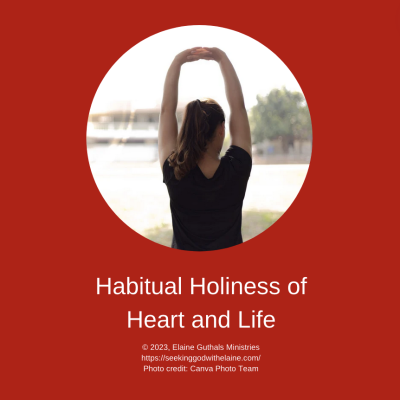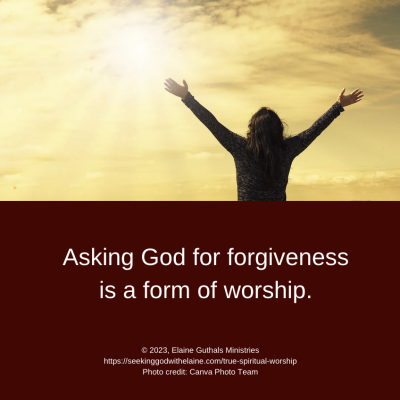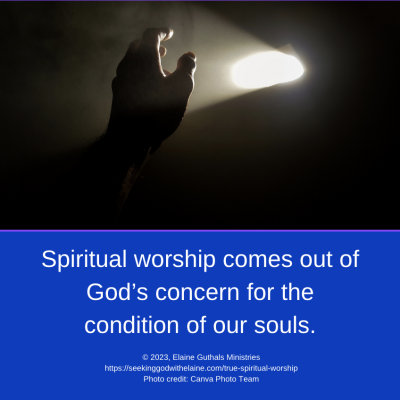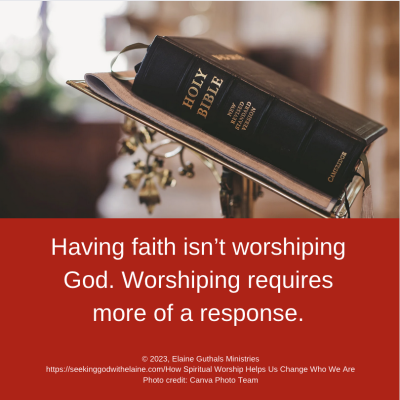
Main Nugget
- Spiritual worship doesn’t follow the requirements of ceremonial law (Ceremonial Law v. Spiritual Worship).
- Spiritual worship is all about having a heart that is right with God (Spiritual Worship v. Ceremonial Law).
- Spiritual worship requires a change of reliance (Ceremonial Law v. Spiritual Worship).

Forming Our Habits to Grow Our Relationship with God
- We get that we can’t see God because He is spirit, but that makes us question if He is real (The Concept of the Spirit).
- We are an image of God, but we are really, really flawed. If Jesus was just an image of God, would He have been the perfect Sacrifice? I don’t think so. Jesus had to be 100% God and 100% Man. That was the only way that He would be the appropriate substitute to serve the penalty for our sins (The Concept of the Spirit).
- Worshiping God in spirit and truth means we worship God for Who He is. True spiritual worship focuses on God, not us (Spiritual Worship v. Ceremonial Law).
- We have to take the focus off ourselves and our selfishness and put it on God. This is what makes the distinction between thanksgiving and praise – it isn’t about us. It isn’t about us. It is about Sovereign God and what He has done for us (True Spiritual Worship; Spiritual Worship v. Ceremonial Law).
- God has to have top priority. Our submission to him must be complete. (Only half a bull was never sacrificed — it was the whole animal.) (Why the Ceremonial Law Didn’t Work)
- We can’t focus solely on how we want worship and what we see as truth. We have to worship God’s way (The Concept of the Spirit).
- The original sin was committed because of selfishness. Sacrifice, therefore, is a renunciation of the selfishness. Instead, it is giving our best and first to God (Why the Ceremonial Law Didn’t Work).
- After Adam and Eve committed the original sin, the ball was in God’s court. He could either condemn them or restore them. Actually, God did both. He condemned mankind and designed the Plan of Salvation to restore us to Him (True Spiritual Worship).
- God is pure, so He cannot associate with sin. That is the reason mankind was condemned after the original sin (True Spiritual Worship).
- True spiritual worship is a duty. Our duties to God are based on Who He is. We have an obligation to worship God in spirit. He is still God whether we worship Him or not, but it is for our benefit that we do. We gain peace through our worship of Him. It brings refreshment (True Spiritual Worship; God’s Displeasure with the Ceremonial Law).
- Jesus was chosen to be praised because of His qualifications. Regardless of His lineage, He was and will always be the only one who is pure enough to be a priest (Ceremonial Law v. Spiritual Worship).
- God chooses us based on our faithfulness to Him. Then He equips us for service (Ceremonial Law v. Spiritual Worship).
- God considers us the same. We have all sinned (Spiritual Worship v. Ceremonial Law).
- Our sanctification is all about becoming as He is. God intended that each of us change from what we were to be more like Him. That includes being merciful as He is (God’s Displeasure with the Ceremonial Law).
- God didn’t want the early Church to go backwards (Why the Ceremonial Law Didn’t Work).
- God doesn’t want us to go to church because that is just what we do every Sunday morning. He especially doesn’t want us to go just to have fellowship with the other attendees. God wants us to go to church to meet Him. While we are communing with Him, we are to be worshiping Him (God’s Displeasure with the Ceremonial Law).
- The first instance where the My people designation came up was in Exodus (Ex. 6: 7). The Israelites saw this as an exclusive privilege. And it was. But it wasn’t because of their nationality. He set them apart for a reason. God always intended that His People would expand from just being the Jews to being all mankind (The Transitory Intent of the Ceremonial Law).
- Sanctification is about growth. It is growing our character to be like God’s. That means change — being transitory (The Transitory Intent of the Ceremonial Law).
- God’s commands aren’t random. But neither is He a dictator. God wants us to understand our calling and readily, cheerfully, and completely obey (Putting Spiritual Worship into Practice).
- The original sin was a physical act of disobedience against God. Yes, the choice was made to sin in the mind. It had to be carried out with the body (Spiritual Worship with Our Bodies).
- God wants us to yield our will to His. What we don’t always think about is that, if we are not submitting to God, we are submitting to Satan (Spiritual Worship with Our Bodies).
- The Holy Spirit assists us in our prayers. No, the Holy Spirit doesn’t say our prayers for us. We still have to take an active part in them. The Holy Spirit is interceding for us (Prayer in Spiritual Worship).
- The Holy Spirit assists us in our spiritual worship (Prayer in Spiritual Worship).
- God knows we will be weak. He uses us despite our weaknesses. No, God uses us because of our weaknesses (Prayer in Spiritual Worship).
- God has good reason to want our hearts. He wants to cleanse them with Jesus’ atoning blood. Then, He wants to fill us with wisdom and understanding through the work of the Holy Spirit (The Sincerity of Spiritual Worship).
- It is understandable why God wants our hearts. If we give Him that, in essence, we are giving Him all of us — our will, strength, and love (The Sincerity of Spiritual Worship).
- God knows our limitations because He is the one Who gave us our skills and abilities. He expects what He has given us be used for Him (Sincere Praise, Obedience, and Faith in Spiritual Worship).
Glossary

Forming Our Habits to Grow Our Maturity
- True spiritual worship is rewarding true submission (True Spiritual Worship).
- It would be horrible for us to start this new life of faith and spiritual privilege and keep keep hold of the old way of life (Ceremonial Law v. Spiritual Worship).
- It isn’t about us doing the do’s and not doing the don’ts. God isn’t interested in a checklist, much less our success rate in completing it. God is interested in our devotion to Him. No, that does not negate our duty to God. He still expects things from us. We should want to serve Him because He is Creator. It reinforces that we cannot earn salvation (Spiritual Worship v. Ceremonial Law).
- One of the biggest rewards we get is that we get to be ministers of the gospel. We get to tell others the good news. We get privileges that non-believers do not get (Spiritual Worship v. Ceremonial Law).
- We shouldn’t boast of the privilege we think comes along with being children of God any more than we should boast of ourselves. We are only made righteous through Jesus’ sacrifice (Spiritual Worship v. Ceremonial Law).
- Our actions are not necessarily representative of our character. Our words may not mirror our hearts and thoughts. We can’t just go on our own thoughts and feelings. We can’t even rely solely on our belief system. Those are transitory at best and delusional at worst. Instead, God wants our character to change to be like His (Spiritual Worship v. Ceremonial Law).
- We have to get our submission to God down to the heart level. Our focus must be on God (Spiritual Worship v. Ceremonial Law).
- We don’t become God. We become like God, just as a shadow is like the person but really isn’t the person. Take that a step further. The shadow does everything the person does, just as we are to do what God does. It breaks down on the flip side, though. The shadow doesn’t do anything the person doesn’t do. We, however, do things that God doesn’t — we sin (Why the Ceremonial Law Didn’t Work).
- Jesus said He wasn’t doing away with the law. That means we have to live by the moral law. Its principles still apply (God’s Displeasure with the Ceremonial Law).
- We can’t just worship through our actions. We can’t just be a good person. We can’t just do good deeds to others. We have to worship God in spirit and in truth. And that means really worship. Not just show up. Worship. It goes back to our hearts being right (God’s Displeasure with the Ceremonial Law).
- Until we get that sinful nature under control and out of us, we can’t enter Heaven. We get it under control in this life by exercising discipline to build godly habits. We get it out of us by completing the Sanctification Road. No, we are not talking about going through some self-help program. We can’t discipline ourselves. Only God can (The Transitory Intent of the Ceremonial Law).
- We have to be ready to serve God when He calls. We have to remain sober minded and spiritually clean to pick up the tasks God has for us (Putting Spiritual Worship into Practice).
- Worship isn’t just singing. It isn’t just reading God’s Word and praying. It is putting what we have learned through the Holy Spirit into practice to show the changes He has made in our lives (Putting Spiritual Worship into Practice).
- We are called to live consecrated lives. That means we devote our lives to serving God the way He calls us (Putting Spiritual Worship into Practice).
- We are all required to worship, just as we are all called to be priests. No one gets a pass worship free card. This isn’t Monopoly (Putting Spiritual Worship into Practice).
- We worship God with our bodies as we carry out the actions associated with our choices (Spiritual Worship with Our Bodies).
- Body, soul, and spirit are all connected. The soul bone and the spirit bone are connected to the body bone. Total submission to God can’t happen without all three (Spiritual Worship with Our Bodies).
- We have to remember that bodies doesn’t just mean our physical skeleton. It means our nature, too. It means our character and identity. We have to identify as God’s child.
- God doesn’t want to dictate who we are and what we are. He gives us a choice. We have to want to choose Him (Spiritual Worship with Our Bodies).
- We are to imitate Jesus, Who gave His body as a sacrifice for God. The worship Jesus gave to God indicated that He would do whatever God asked, regardless of the consequences (Spiritual Worship with Our Bodies).
- We don’t have to be some wonderful, strong disciple. We just have to be obedient to God’s Will (Prayer in Spiritual Worship).
- Our will and affections aren’t subjugated to God. He allows our personalities to stay intact. But we have a new nature (Prayer in Spiritual Worship).
- We grow in sanctification by prayer (Prayer in Spiritual Worship).
- Prayer helps us grow more than service activities do. Doing the Matthew 25: 35-36 good deeds help us, but prayer is the key to becoming more like God (Prayer in Spiritual Worship).
- It seems like most of our prayers center around the physical health of us and others. We focus on earthly needs. Worse than that, what we pray for isn’t always in God’s Will. We keep putting kinks in God’s plans (Prayer in Spiritual Worship).
- In order to worship God, our prayers should focus on praising Him, following His Will, and expanding His kingdom (Prayer in Spiritual Worship).
- We should continually worship God in the Spirit (Prayer in Spiritual Worship).
- We are to be sincere, but sincerely alone isn’t what we are talking about. Saul was sincere about serving God the way he thought was right. It wasn’t. That tells us how much Saul changed to be Paul. Paul worshiped God through his belief in Jesus. He did it right (The Sincerity of Spiritual Worship).
- We can be sincere about feeding the hungry, caring for the sick — all the sheep and goat activities. They mean nothing if we aren’t sincere about worshiping God (The Sincerity of Spiritual Worship).
- We have to submit all our heart to God. We can’t hold some back for ourselves. We can’t give God lip service (The Sincerity of Spiritual Worship).
- When we ask Jesus to be our Savior and Redeemer, we have to truly desire to become like Him. We have to genuinely repent and not commit our sins again (The Sincerity of Spiritual Worship).
- Our intent in performing our actions must be to worship God in spirit and truth (The Sincerity of Spiritual Worship).
- We should worship God in spirit and truth because of our love for Him. God asks for our love. It is our choice whether or not to give it to Him (The Sincerity of Spiritual Worship).
- By giving God our hearts, we pledge to seek His Will rather than our own. We give God our hearts to show God our love and gratitude. We also acknowledge that He is Sovereign God (The Sincerity of Spiritual Worship).
- The choice to give God our hearts is ours. He acknowledges our dignity (The Sincerity of Spiritual Worship).
- We must give all of our hearts to God. We can’t be double minded (Jas. 1: 7-8) (The Sincerity of Spiritual Worship).
- The praise is good. But it has to be more than that. It has to come out of our mouths initially. The proof is when it comes out of our actions (Sincere Praise, Obedience, and Faith in Spiritual Worship).
- The sincerity part comes when we offer the praise freely. It has to come from our free will. It has to be unrestrained, continuous praise (Sincere Praise, Obedience, and Faith in Spiritual Worship).
- Our sincerity has to be shown in our acceptance of the laws and commandments (Sincere Praise, Obedience, and Faith in Spiritual Worship).
- We won’t have a personal or corporate response of admiration (confession, thanksgiving, praise, etc.) for God if our attitude to God’s presence is not one of love and we don’t imitate His character (Sincere Praise, Obedience, and Faith in Spiritual Worship).
- Intellectual faith would be in the mind. We would rely on ourselves to make sense of things. But when we get our knowledge down to the heart level, we take the knowledge from the mind and combine that with our mental state and run them through a biblical processor (Sincere Praise, Obedience, and Faith in Spiritual Worship).
- Our sincerity of faith is proportional with our belief in God. That belief is necessary to realize obedience to God’s laws. Perfection/maturity is the end result for which we are shooting (Sincere Praise, Obedience, and Faith in Spiritual Worship).

Glossary
Forming Our Habits to Grow Our Relationship with Others
- We cannot condone sin as a way of loving others (God’s Displeasure with the Ceremonial Law).
- Worldview people can throw it up in our faces when they think who we are is too spiritual or godly. To them, it is a bad thing. To us, it is a good thing. That is the way God thinks of us (Putting Spiritual Worship into Practice).

Ceremonial Law
- There are eternal consequences if we hold onto the ceremonial law (Spiritual Worship v. Ceremonial Law).
- The whole purpose of the law was to point out we were doing it wrong, and we couldn’t fix it ourselves. We can do nothing to gain salvation until we accepted the gift that God gave us – Jesus as our Savior (Spiritual Worship v. Ceremonial Law).
- Neither do the ceremonial laws don’t change our hearts nor do they purify our consciences like spiritual worship does (Why the Ceremonial Law Didn’t Work).
- The ceremonial laws served the purpose to show us that we need a Savior (Why the Ceremonial Law Didn’t Work).
- Ceremonial law does not cleanse as spiritual worship does (Why the Ceremonial Law Didn’t Work).
- God saw moving from ceremonial law to spiritual worship as an exchange. People saw it as a change. It had to be an exchange if Jesus was completing it, not abolishing it. The hope of the coming Messiah was exchanged for the faith in the risen Savior (Why the Ceremonial Law Didn’t Work).
- Instead of abolishing the law, we are to write it on our hearts (Why the Ceremonial Law Didn’t Work).
- The ceremonial laws could take us only so far because Jesus hadn’t completed the Plan of Salvation (God’s Displeasure with the Ceremonial Law).
- The laws show us what sin is. It does not, however, grant us righteousness (God’s Displeasure with the Ceremonial Law).
- The covenant of Abraham was replaced by the covenant of Jesus, providing the opportunity for the switch of the priests coming from the tribe of Levi to the tribe of Judah (Ceremonial Law v. Spiritual Worship).

Sacrifices
- A sacrifice is a gift. They were to bring something of themselves to give it to God.
- God wants us to perform sacrifices His way, not the way we want to do (God’s Displeasure with the Ceremonial Law).
- Sacrifices didn’t demonstrate the law. How can killing animals demonstrate righteousness? The laws show us God’s character. We are to imitate that character (Why the Ceremonial Law Didn’t Work).
- The sacrifices did nothing to show us Who God really is. For that matter, we really can’t know God by studying His Word. He has to reveal Himself to us through the Holy Spirit. God will only reveal Himself to His children. We only become His children by believing in Jesus. So, we can’t “reason out” Who God is (Why the Ceremonial Law Didn’t Work).
- These sacrifices were the Jew’s worship. The worship wasn’t the killing part. The worship was the giving part (Why the Ceremonial Law Didn’t Work).
- We still make sacrifices today for God. They are just different sacrifices — not animal sacrifices (God’s Displeasure with the Ceremonial Law).
- If the sacrifice is living, it is a 24/7/365/eternity practice. It isn’t something we take on and off. It is continuous (Putting Spiritual Worship into Practice).
- When we think of living sacrifice, we think of what we do. When we think of spirituality, we think of who we are. But living sacrifice is equated with spirituality (Putting Spiritual Worship into Practice).
- We might call it the two D’s: doctrine and duty. In today’s vernacular, it is more well received if we call the duty service. It is what James calls faith and works (Putting Spiritual Worship into Practice).
- We also have to offer our bodies. This is another way of saying that we must offer real, continuous, active, voluntary service (Putting Spiritual Worship into Practice).
- Our sacrifice has to be total — mind, body, and soul. That way the good actions are the foundation. They lead to other good actions. If the sacrifice wasn’t complete, we would be unclean. Iffy actions would be the foundation. Yeah, we might get some good actions — but we would also get bad actions (Spiritual Worship with Our Bodies).

Spiritual Worship
- The main difference between the ceremonial law and spiritual worship is what we are presenting. Law required a dead animal. Spiritual worship requires a continuous offering of a living us. We are to give of our time, talents, and money. Those mean nothing if we do not offer ourselves — our hearts (Putting Spiritual Worship into Practice).
- Putting spiritual worship into practice entails the right motives. We can’t be doing it for personal reasons. We can’t be doing it just to escape hell. We have to worship God because we love the Sovereign God (Putting Spiritual Worship into Practice).
- We think of spiritual worship as formal worship. That isn’t necessarily so. We think we have to pray in the King James Version. Or we have to set our clocks by when we pray. No. We just have to sincerely talk to God. We have to use the full range of prayer. True, at times they may just be sentence prayers. Those sentences can be packed when they are an at-the-end-of-our-rope desperate appeal. But prayer is more than that. It is building a relationship with our Heavenly Father. That takes time and commitment.
- We have to have habitual contact with God. No pretense. No ulterior motive. It has to be a desire to spend time with God. Prayer has to be a part of us (Prayer in Spiritual Worship).
- Giving God our hearts is spiritual worship (The Sincerity of Spiritual Worship).
- Spiritual worship contains elements of praise and obedience (Sincere Praise, Obedience, and Faith in Spiritual Worship).
- An offering is a present. God gives us the gift of salvation. We give Him the gift of obedience (Sincere Praise, Obedience, and Faith in Spiritual Worship).
- Spiritual worship contains elements of faith (Sincere Praise, Obedience, and Faith in Spiritual Worship).
- Faith is an important element in spiritual worship. Faith is believing in God (Sincere Praise, Obedience, and Faith in Spiritual Worship).
- Spiritual worship provides more rewards than ceremonial law did (Spiritual Worship v. Ceremonial Law).

Making the Connections
- Because ceremonial law doesn’t work, we need to focus on spiritual worship rather than today’s equivalent (Why the Ceremonial Law Didn’t Work).
- Circumcision can be replaced by baptism as an outward duty we can elevate to too high a standing. Baptism cannot bring us salvation any more than circumcision could (Spiritual Worship v. Ceremonial Law).
- Being born of Jewish parents can be replaced by being born of Christian parents. We must individually choose to believe in Jesus (Spiritual Worship v. Ceremonial Law).
- The Jews thought knowing the law rather than doing the law was fine. Believers sometimes think the same (Spiritual Worship v. Ceremonial Law).
- The Pharisees thought they could add laws on things in which God is indifferent. Don’t some believers think others have to believe the way they do? (Spiritual Worship v. Ceremonial Law)
- The Jews put too much emphasis on rituals and not enough on their moral duties of the law. Don’t we sometimes just follow God on Sundays and not the rest of the week? (Spiritual Worship v. Ceremonial Law).
- The ceremonial laws are not a hindrance to spiritual awareness. But we make them hindrances because we latch onto them and don’t see their purpose. One purpose was to show we couldn’t save ourselves. We need Jesus as our Savior and Redeemer (God’s Displeasure with the Ceremonial Law).
- Another purpose was to set Israel apart from the other nations. Their ceremonial laws showed that they were God’s people. Until Jesus came, people needed to show that they were worshiping God (God’s Displeasure with the Ceremonial Law).
- Maybe the ceremonial laws were for the milk babies, and spiritual worship is for the steak adults. No, not necessarily for individual people, but for the Church as a whole. It couldn’t be a Church until Jesus came. Abraham, Moses, David, and all the rest were only babies because the Plan of Salvation hadn’t come to fruition. But they needed the spiritual milk to get to the spiritual steak. This is the same concept as sometimes we have to sin to realize what obedience and submission are (God’s Displeasure with the Ceremonial Law).
- Bottom line is we cannot have spiritual worship if we didn’t have the ceremonial laws. That tells me that God isn’t displeased with His laws since we had to have the ceremonial laws to show the need for spiritual worship. What God is displeased with is our observance of them. God didn’t see the sacrifices being offered to worship Him.
- Originally, there was no difference between mercy and sacrifice. Our love for God and the sacrifices we give to worship Him have the same intent as our love for others. We can’t say that our only sacrifice for God is serving others (God’s Displeasure with the Ceremonial Law).
- We put spiritual worship into practice when we live our lives totally committed to God (Putting Spiritual Worship into Practice).

To read devotions in the Redo for Godliness series, click the appropriate button below.